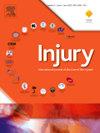TORCH: addressing the gap in training for ward based care of major trauma patients
IF 2
3区 医学
Q3 CRITICAL CARE MEDICINE
Injury-International Journal of the Care of the Injured
Pub Date : 2025-09-20
DOI:10.1016/j.injury.2025.112770
引用次数: 0
Abstract
Introduction
A dedicated Major Trauma Ward (MTW) is core to the function of a Major Trauma Centre (MTC). MTCs are central to the hub-and-spoke model of an inclusive Major Trauma System (MTS). The implementation of the London Major Trauma System is heralded to have increased the in-hospital odds ratio of survival of traumatically injured patients by 19 %. There is no one universal definition of Major Trauma, but the National Institute for Health and Clinical Excellence (NICE) provides the definition, “Major trauma is defined as an injury or combination of injuries that are life-threatening and could be life changing because it may result in long-term disability”.
Major Trauma is a disease requiring multidisciplinary and multi-specialty input at every stage of the continuum of care. However, there is no formal education for staff on a MTW on the care of these complex, severely injured patients.
The Trauma ORchestration of Continuing Healthcare (TORCH) course was established in 2018 to help to address this educational void. The aims of this paper are to describe the rationale for the course, report the feedback, and identify key strengths and areas for improvement.
Methods
A mixed methods study was undertaken with simultaneous quantitative and qualitative analysis. Descriptive statistics of quantitative data was undertaken to describe delegate demographics. Thematic analysis of the 136 attendee responses to course feedback was performed. Course feedback was assimilated contemporaneously at the end of each course via online survey.
Results and Discussion
There was an 88 % (136/154) response rate to feedback. Attendees included 96 doctors, and 16 nurses and allied health professionals. The 2019 course of 24 delegates did not stratify participant demographics. The largest group of doctors (39 %) were Senior House Officer grade, with 41 % of all doctors coming from a surgical background.
Feedback themes identified as course strengths include the multidisciplinary curriculum approach. Speakers include Consultants from 12 different specialties and multiple therapists across the continuum of trauma care. Lectures based on real life case discussion was found to be an engaging and thought provoking medium of education with the focus on MTW based decision making commonly required of MTW junior staff.
Areas for future development include the continued delivery of the TORCH course outside of London and consideration of course validation for quality assurance, and a “train the trainer” model to allow for course expansion and sustainability in other MTSs of the UK and Ireland to implement formal, high quality education for staff on MTWs.
火炬:解决重大创伤患者病房护理培训的差距
专门的重大创伤病房(MTW)是重大创伤中心(MTC)功能的核心。mcs是一个包容性的重大创伤系统(MTS)的中心和辐射型模型的核心。伦敦重大创伤系统的实施预示着创伤性受伤患者的住院生存率增加了19%。重大创伤没有一个统一的定义,但国家健康与临床卓越研究所(NICE)提供了定义,“重大创伤被定义为危及生命的伤害或伤害组合,可能会改变生活,因为它可能导致长期残疾”。重大创伤是一种疾病,在连续护理的每个阶段都需要多学科和多专业的投入。然而,在护理这些复杂的、严重受伤的病人方面,没有对工作人员进行正规的培训。持续医疗保健的创伤编排(TORCH)课程成立于2018年,旨在帮助解决这一教育空白。本文的目的是描述课程的基本原理,报告反馈,并确定关键优势和需要改进的领域。方法采用混合方法进行定量和定性分析。对定量数据进行了描述性统计,以描述代表的人口统计情况。对136名与会者对课程反馈的反应进行了专题分析。课程反馈在每门课程结束时通过在线调查同步吸收。结果与讨论反馈的回复率为88%(136/154)。与会者包括96名医生,16名护士和相关卫生专业人员。2019年的24名代表的课程没有对参与者的人口统计进行分层。最多的医生群体(39%)是高级院务主任级别,所有医生中有41%来自外科背景。作为课程优势的反馈主题包括多学科课程方法。演讲者包括来自12个不同专业的咨询师和创伤护理连续体的多位治疗师。基于真实案例讨论的讲座是一种引人入胜且发人深省的教育媒介,其重点是MTW初级员工通常需要的基于MTW的决策。未来发展的领域包括继续在伦敦以外的地区提供TORCH课程,并考虑对课程质量保证进行验证,以及“培训培训师”模式,以允许在英国和爱尔兰的其他MTWs中扩展课程并保持可持续性,从而为MTWs的员工实施正式的高质量教育。
本文章由计算机程序翻译,如有差异,请以英文原文为准。
求助全文
约1分钟内获得全文
求助全文
来源期刊
CiteScore
4.00
自引率
8.00%
发文量
699
审稿时长
96 days
期刊介绍:
Injury was founded in 1969 and is an international journal dealing with all aspects of trauma care and accident surgery. Our primary aim is to facilitate the exchange of ideas, techniques and information among all members of the trauma team.

 求助内容:
求助内容: 应助结果提醒方式:
应助结果提醒方式:


